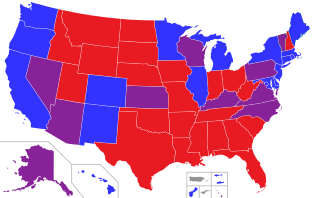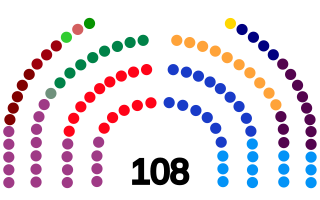Related Research Articles
Administrative law is a division of law governing the activities of executive branch agencies of government. Administrative law includes executive branch rulemaking, adjudication, and the enforcement of laws. Administrative law is considered a branch of public law.
Jurisdiction is the legal term for the legal authority granted to a legal entity to enact justice. In federations like the United States, the concept of jurisdiction applies at multiple levels.

Law enforcement is the activity of some members of the government or other social institutions who act in an organized manner to enforce the law by investigating, deterring, rehabilitating, or punishing people who violate the rules and norms governing that society. The term encompasses police, courts and corrections. These three components of the criminal justice system may operate independently of each other or collectively through the use of record sharing and cooperation. Throughout the world, law enforcement are also associated with protecting the public, life, property, and keeping the peace in society.

A senate is a deliberative assembly, often the upper house or chamber of a bicameral legislature. The name comes from the ancient Roman Senate, so-called as an assembly of the senior and therefore considered wiser and more experienced members of the society or ruling class. However the Roman Senate was not the ancestor or predecessor of modern parliamentarism in any sense, because the Roman senate was not a de jure legislative body.

A legislature is a deliberative assembly with the legal authority to make laws for a political entity such as a country, nation or city on behalf of the people therein. They are often contrasted with the executive and judicial powers of government. Legislatures can exist at different levels of government–national, state/provincial/regional, local, even supranational. Countries differ as to what extent they grant deliberative assemblies at the subnational law-making power, as opposed to purely administrative responsibilities.

In the United States, the state legislature is the legislative branch in each of the 50 U.S. states.

Emergency services and rescue services are organizations that ensure public safety, security, and health by addressing and resolving different emergencies. Some of these agencies exist solely for addressing certain types of emergencies, while others deal with ad hoc emergencies as part of their normal responsibilities. Many of these agencies engage in community awareness and prevention programs to help the public avoid, detect, and report emergencies effectively. Emergency services are often considered first responders, and typically have dedicated emergency vehicles.

A committee or commission is a body of one or more persons subordinate to a deliberative assembly or other form of organization. A committee may not itself be considered to be a form of assembly or a decision making body. Usually, an assembly or organization sends matters to a committee as a way to explore them more fully than would be possible if the whole assembly or organization were considering them. Committees may have different functions and their types of work differ depending on the type of organization and its needs.

The federal government of the United States is the common government of the United States, a federal republic located primarily in North America, comprising 50 states, five major self-governing territories, several island possessions, and the federal district of Washington, D.C., where the majority of the federal government is based.
Nonpartisan democracy is a system of representative government or organization such that universal and periodic elections take place without reference to political parties. Sometimes electioneering and even speaking about candidates may be discouraged, so as not to prejudice others' decisions or create a contentious atmosphere.

A government agency or state agency, sometimes an appointed commission, is a permanent or semi-permanent organization in the machinery of government (bureaucracy) that is responsible for the oversight and administration of specific functions, such as an administration. There is a notable variety of agency types. Although usage differs, a government agency is normally distinct both from a department or ministry, and other types of public body established by government. The functions of an agency are normally executive in character since different types of organizations are most often constituted in an advisory role — this distinction is often blurred in practice however, it is not allowed.
A students' union or student union, is a student organization present in many colleges, universities, and high schools. In higher education, the students' union is often accorded its own building on the campus, dedicated to social, organizational activities, representation, and academic support of the membership.
A standards organization, standards body, standards developing organization (SDO), or standards setting organization (SSO) is an organization whose primary function is developing, coordinating, promulgating, revising, amending, reissuing, interpreting, or otherwise contributing to the usefulness of technical standards to those who employ them. Such an organization works to create uniformity across producers, consumers, government agencies, and other relevant parties regarding terminology, product specifications, protocols, and more. Its goals could include ensuring that Company A's external hard drive works on Company B's computer, an individual's blood pressure measures the same with Company C's sphygmomanometer as it does with Company D's, or that all shirts that should not be ironed have the same icon on the label.

The Congress of the Republic of Colombia is the name given to Colombia's bicameral national legislature.

Most U.S. states and territories have at least two tiers of local government: counties and municipalities. Louisiana uses the term parish and Alaska uses the term borough for what the U.S. Census Bureau terms county equivalents in those states. Civil townships or towns are used as subdivisions of a county in 20 states, mostly in the Northeast and Midwest.

The government of Florida is established and operated according to the Constitution of Florida and is composed of three branches of government: the executive branch consisting of the governor of Florida and the other elected and appointed constitutional officers; the legislative branch, the Florida Legislature, consisting of the Senate and House; and the judicial branch consisting of the Supreme Court of Florida and lower courts. The state also allows direct participation of the electorate by initiative, referendum, and ratification.
Congressional oversight is oversight by the United States Congress over the executive branch, including the numerous U.S. federal agencies. Congressional oversight includes the review, monitoring, and supervision of federal agencies, programs, activities, and policy implementation. Congress exercises this power largely through its congressional committee system. Oversight also occurs in a wide variety of congressional activities and contexts. These include authorization, appropriations, investigative, and legislative hearings by standing committees; which is specialized investigations by select committees; and reviews and studies by congressional support agencies and staff.
The administrative divisions of Virginia are the areas into which the Commonwealth of Virginia, a U.S. state, is divided for political and administrative purposes. Some are local governments; others are not. However, all local governments are political subdivisions of the state.
A law enforcement agency (LEA) is any government agency responsible for law enforcement within a specific jurisdiction through the employment and deployment of law enforcement officers and their resources. The most common type of law enforcement agency is the police, but various other forms exist as well, including agencies that focus on specific legal violation, or are organized and overseen by certain authorities. They typically have various powers and legal rights to allow them to perform their duties, such as the power of arrest and the use of force.

The politics of France take place within the framework of a semi-presidential system determined by the French Constitution of the French Fifth Republic. The nation declares itself to be an "indivisible, secular, democratic, and social Republic". The constitution provides for a separation of powers and proclaims France's "attachment to the Rights of Man and the principles of National Sovereignty as defined by the Declaration of 1789".
References
- Rossum, Ralph A., American Constitutional Law, ISBN 978-0813347455 (Ninth Edition - 2013)